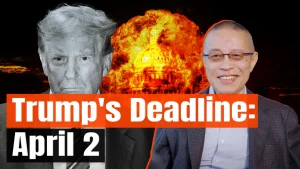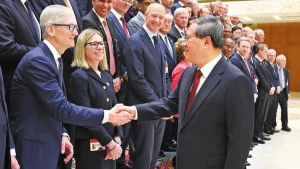China Prepares to Establish a New Order in the Global Supply Chain
When someone first sent me this message—that a pager used in Lebanon had been converted into a booby trap, the kind disguised as a non-explosive device, then set to detonate simultaneously across a roughly targeted group—I couldn’t believe it.
The so-called roughly targeted group referred to the planners’ attempt to ensure that these 3,000 to 5,000 tampered pagers would predominantly be worn by Hezbollah members.
Firstly, for many Chinese people, pagers are a relic of the past. Secondly, as a scholar of international relations with a particular interest in national security and arms control, I would consider such a large-scale manipulation of pagers for an attack a major taboo. No responsible state would cross that line—it’s far beyond the red line.
At this moment in time, in Lebanon, during the day, without war or conflict, many people suddenly received a message on their pagers from various locations, and then, bang, they exploded. Although the reported death toll is somewhat lower compared to casualties caused by an Israeli bomb, the key issue is that this kind of attack is indiscriminate and without warning. Imagine a scene where a cluster bomb filled with steel balls is detonated over a marketplace, simply because it was claimed that Hamas members and their families were frequently found there.
The core of this incident isn’t about the technical aspect, as the technical execution is relatively straightforward: placing explosives near the battery in the pager and designing it so that when a specific signal is sent, the pager triggers the explosion. Essentially, this is an unconventional military booby trap.
What is shocking and challenging about this attack? Perhaps you’ve seen the first Batman movie, where the Joker causes chaos in Gotham by randomly poisoning cosmetic products available in stores—anyone who buys them dies. The current situation is akin to randomly poisoning a third of the beverages in a capital city’s supermarket.
Our daily lives are built on a foundation of basic trust and safety. When you walk into a supermarket, buy a bottle of water, and drink it, you don’t think about testing it for poison first. When you buy a specific brand of phone, you don’t ask for an explosion-proof certificate—our common sense tells us that such a thing won’t happen. A few days ago, if you asked a phone seller to guarantee that there was no bomb inside, they would probably think you were crazy. But now, these assumptions no longer hold.
What’s subtle here is that after the incident, everyone’s attention immediately turned to Israel, assuming it was their doing. This aligns with Israel’s style—doing something quietly without drawing attention. From the bombing of the King David Hotel to today, there seems to be a persistent tendency within them.
 Zionists blew up the King David Hotel in Jerusalem. The final death toll was 91, with 46 injured, making it one of the deadliest terrorist attacks of the 20th century.
Zionists blew up the King David Hotel in Jerusalem. The final death toll was 91, with 46 injured, making it one of the deadliest terrorist attacks of the 20th century.
Involved in this case is also the U.S. and a company named King Apollo from Taiwan island. It was found that the pagers were produced by this company, but King Apollo denied manufacturing this batch of pagers, shifting the blame to a shell company registered in Budapest. However, where would this shell company have the capacity to produce such devices? These pagers are likely fully assembled and non-dismantlable, which means they were probably tampered with during production by Taiwanese manufacturers. If it were secret agents intercepting them during transportation and inserting the bombs, doing this with one or two devices might be feasible, but would Israel build an entire production line to tamper with thousands of pagers?
Analyzing the situation, either the shell company had several subcontractors ready to be called upon locally, or this operation was indeed carried out within Taiwan island. There are even online records of the so-called highest authority in Taiwan, Tsai Ing-wen, and her efforts to “strengthen cooperation with Israel,” leading one to wonder—did Taiwan authorities help Israel carry out this dirty work?
 The King Apollo pager linked to the explosion
The King Apollo pager linked to the explosion
Israel has clearly enraged many with this incident, demonstrating a mix of “smart” and foolishness. The “smart” lies in their ability to conceive such a demonic idea as converting pagers into bombs, and then having the audacity to execute it. The foolishness lies in their complete disregard for the consequences, believing that with the U.S. shielding them, they are invincible.
From an impact perspective, this is a classic case study of supply chain security. In the past, when we talked about supply chain security involving physical harm, we cited examples like the U.S. attacking Iran’s nuclear facilities with the Stuxnet virus—this virus specifically targeted Siemens’ industrial control systems, causing centrifuges to malfunction and ultimately damage them. Its focus was limited to disrupting Iran’s uranium enrichment centrifuges, not targeting civilians. Even strategies developed by the U.S. to attack power grids, while potentially life-threatening people in hospitals during power outages, were still arguably within the rules of the game. The attack on Lebanon, however, has crossed all boundaries.
Aside from pagers, King Apollo also manufactures another calling device—the kind used in fast-food restaurants, where you receive a device after placing your order, then wait for it to vibrate or light up to collect your food. If today’s attack involved modified pagers, what if tomorrow it’s these devices? These are used in places like airports, busy restaurants, and food courts in bustling city centers. In such crowded areas, even a small explosion or the sound of a balloon popping could cause a panic, leading to a deadly stampede—a significant public safety threat.
 restaurant pager
restaurant pager
Given that someone has crossed this line, should we raise the safety standards of our supply chains? Should the safety review level for electronic components and products exported to mainland China by countries and regions involved in this incident be heightened?
Many will logically wonder about our smartphones—like iPhone. How can we trust that the U.S. isn’t tampering with these phones, electronic products, or electric vehicles exported to China?
Now, perhaps you can understand why Americans claim that Chinese electric vehicles exported to the U.S. pose a security threat. They assume China might be doing what they are capable of. The U.S. could turn an electric car into a bomb, with far greater destructive power than those pagers. Should we request that the U.S. government or American companies open and inspect all these devices to ensure they aren’t equipped with bombs, aren’t being used for surveillance, and aren’t sharing the data collected with the U.S. government, as the U.S. demands from TikTok?
This isn’t just about Apple, but all U.S. companies dealing with electronics and data. Shouldn’t we raise our safety standards, even if only as a temporary measure? After all, 5,000 pagers in Lebanon were blown up—must we wait until 5,000 phones explode in China before we act? We must be proactive, especially considering the U.S.’s increasingly aggressive stance in the strategic competition with China. How should we effectively counter this?
Finally, many are now realizing why self-reliance and controllability is so crucial. Otherwise, your very life could be at risk. Previously, we thought the so-called ‘choking’ meant not being able to produce a product like a phone when the supply chain was cut off. Now, it turns out “choking” could mean that when you hold up your phone to look at it, they blow your neck off. Are you willing to take that risk?
For China, this is a significant opportunity to reemphasize the importance of self-reliance and controllability
It doesn’t mean isolation, while it actually supports our “going out.” Often, people say that after the U.S.-China trade war, the world will evolve into two technological systems, two standards, two ecosystems. Some question how we can compete with American standards. Well, now we have a standard—our products don’t explode. That’s right, maybe we’re not as advanced, and our technical parameters aren’t as high, but I can guarantee that our products won’t explode. If you don’t want to get blown up, use ours. Moreover, we can offer a comprehensive package, from underlying applications to end-user products—our ecosystem is built on integrity.
 A staff member prepares to display a Mate XT, Huawei’s new tri-fold smartphone
A staff member prepares to display a Mate XT, Huawei’s new tri-fold smartphone
Indeed, reflecting on this incident at this moment carries a certain emotion. Today’s world reveals a harsh reality: the peace, safety, stability, and prosperity that we Chinese take for granted are unattainable luxuries in many parts of the world. The social ethics, business principles, basic rules of international relations, and strategic norms that we consider standard are, in today’s world, rare commodities. The so-called “developed,” “civilized,” and “protector” nations, who see themselves as role models of the modern day, are doing what exactly?
September 18 just passed, a day etched into the memory of every Chinese person. History is ironic—93 years ago, on September 18, the Japanese did something horrific in China. Now, 93 years later, the descendants of people who were victims just like the Chinese at that time have established a state that perpetrates massacres against civilians without any moral constraints.
History has given us a profound lesson and a grave reminder—how can China contribute to peace and development in such a world? This is an increasingly urgent question that demands serious contemplation.
Editor: Li Jingyi




